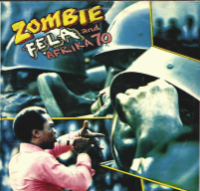(Dieser Artikel wird zum ersten Mal 1998 veröffentlicht.)
‘I no be gentleman at all, I be african man original’, ‘i-no-be-gentleman-at-all’, ‘I no be gentleman at all’
(Fela Anikulapo-Kuti auf der LP “Gentleman”)
Wenn überhaupt, dann ist Fela (gesprochen Fälla) Anikulapo-Kutis Musik bei uns nur bekannt über seinen Auftritt bei den Westberliner Jazzfestspielen 1978 oder von seinen Platten zusammen mit dem Rockschlagzeuger Ginger Baker. Damals hieß Fela noch Ransome-Kuti. Ransome ist ein Name aus der Zeit der Sklaverei und bedeutet “Lösegeld”. Grund genug, sich von seinem Namen zu trennen. Auf den Berliner Jazztagen wurde Fela vom Publikum ausgebuht. Besonders dann, wenn er länger über politische Themen sprach. Dem verständnislosen Publikum entgegnete er, daß seine Musik nicht der Unterhaltung, sondern der Revolution diene. Das brachte ihm allerdings nur noch mehr Gelächter ein. Dahinter stand von seiten des Publikums Unwissen und mangelndes Einfühlungsvermögen in eine andere Welt. Die eigenen Maßstäbe und Meinungen wurden nicht hinterfragt. Tamtam und nackte Neger lassen sich leicht als fremd und primitiv einordnen. Hier aber standen Afrikaner auf der Bühne mit elektrischen Gitarren und Saxophonen. Die Exotik ist gebrochen. Niemand weiß so recht, was er von diesem modernen Afrika halten soll. Die Spuren des Kolonialismus sind deutlich zu sehen und zu hören. Man hätte lieber ein “reines” Afrika. Doch das gibt es nicht mehr. Fela propagiert kein solches folkloristisches Afrika, aber er greift aufs schärfste die “koloniale Mentalität”, besonders die der herrschenden Eliten, an.
Continue reading “Musik, Kunst und Politik in Nigeria. Die Schallplattencover von Ghariokwu Lemi zu Fela Anikulapo-Kutis Musik”

